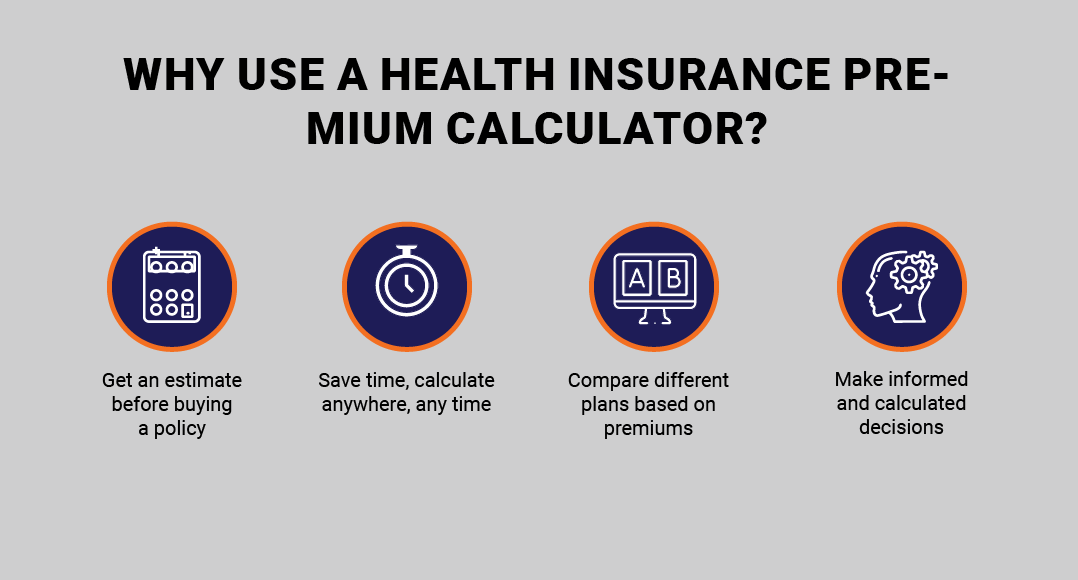How to Calculate Health Insurance Premium and Tax Credit?
Suppose your child asks you to choose a perfect toy for him/her. When you go out to the store, you’re intimidated by the wide array of choices, and suddenly you realize that there’s no clear-cut meaning of ‘perfect’ and it depends on the taste and preferences of your child.
Health Insurance premiums are the same. There’s no standard formula for calculating them, but it depends on you and your health condition and risks. This gives a lot of leeway to most insurance companies to charge high premiums, and that should be the reason that you should try to calculate your premium so that you can look for a policy that charges relatively around the range you have calculated. If you learn, you earn; but if you don’t, there’s no reason to worry because there are a lot of free online insurance premium resources. Nevertheless, if you’re driven by curiosity or if you don’t trust computers as much, this article is for you!
Why should you calculate your health insurance premium at all?
- Makes Financial Planning more accurate for you: If you’ve read any self-help book, the first few chapters would always say that you’re more likely to achieve your goals if you’ve explicitly stated them before starting. The rule applies to your financial goals as well, whatever they are, communicate them clearly, calculate your health premiums and plan accordingly!
- Lowers the risk of defaulting on premium payment: We understand it can be quite scary to have a commitment to paying a monthly health insurance premium at a time when employment scenario is not stable. Therefore, you must equip yourself with two tools- financial planning and financial discipline to lower your risks of defaulting. Knowing the amount, you will pay in the future will record that in your mind when you’re spending!
- Enables you to choose the health policy that fits your needs the best. Knowing how to calculate premiums for each policy will help you do a better cost-benefit analysis of the policy, which should result in better decision-making for you and your loved ones!

How do you Calculate Health Insurance Premiums?
Calculating health insurance premium can be tricky as these figures are contingent on several factors. This article simplifies the aspects you need to evaluate to calculate your health insurance premium. Keep answering these questions mentioned below, that are arranged in the ascending order of complexity:
How old are you? There exists a direct relationship between your age and the amount of premium you pay. The older you are the higher will be the premium payable. A person aged 38 pays more premium compare to a man who is just 23, even if they are the same health-wise.
- Do you suffer from any specific health conditions? The world is a cruel place. Your pre-existing ailments increase the risk of you claiming health insurance in future. Therefore, the insurer charges a higher premium from you for the additional risk it underwrites.
- How large is your family size? While larger families usually bring considerable happiness, they also result in higher premiums as you’ll be paying a premium for each member in your family you want to get insured. This is more so in case of family floaters. However, most policies give discounts for family floaters!
- Are you a male or a female? Females have been proven to not only live longer than men but also healthier. This results in a lower premium for women, generally. There is not hard and fast rule here as ladies are subject to other specific health conditions.
- How comprehensive do you want your health policy to be? The higher the coverage of your policy, the higher the add-ons in your package, the higher the premium. Good things often come at a cost!
- What tenure do you want your policy to be? The longer the premium period, the more convenient it is to you. But convenience comes at the cost of a higher premium. However, some companies also offer a discount for long term policies.
- How large is the sum insured? If a person has a very high sum insured, the insurance company is taking a higher risk for the premium paid. To cover the cost of underwriting the relatively higher risk on your behalf, insurance companies charge a higher premium in such cases.
- Do you smoke? How often do you drink? Get ready for things to get mildly personal. Your family is not the only one discouraging you from smoking and drinking. It turns out that insurance companies are at it too! Frequent smokers and drinkers have higher risks of disease pertaining to their lungs, heart or kidneys. Hence, a higher premium is charged.
- What is your Body Mass Index (BMI)? Your love for sweets and fries can result in your body mass index or BMI shooting up! People with obesity run an enormous risk of cardiovascular health problems. However, people in the healthy BMI range have nothing much to worry about!
- What type of policy are you looking for? Usually, individual plans cost higher than family floater plans. This is an added incentive for you to secure your dear ones via floaters!
- What are your policy’s rules on co-payment and deductibles? Higher the copayment share you are willing to pay, lower the premium charged by the insurer.
- How do you deal with No Claim Bonus (NCB)? If you renew a health insurance policy, the effective premium gets reduced as you can now avail an NCB, depending on the policy you choose. NCBs can range from 20 to 50% and come in the form of cover enhancement.
- Does a disease run in your family? Having a disease that runs in your family increases the chances of you contracting it as well. Thus, insurance companies charge higher premiums for these cases where people are prone to hereditary or genetic problems.
- Are you a rash driver? Never thought you’d be asked this? A record that proves you’re a rash driver might increase your premium for some policies. So, any speed challans or involvement in accidents may actually work against you in the health cover.
- Other factors: Not everything can be in your control. There are other factors like the Insurance Claimed Ratio (ICR) of the company, savings and investments that can vary your premium amount broadly. Even other factors such as your hobbies and marital status play an important role in determining your premium.
How to Lower Your Health Insurance Premiums
Here are three simple tips to save on insurance premiums:
- Get Insured as early as possible: Don’t overexert your mind. Health insurance comes with the benefits of being worry-free and tax benefits. Get your health insured sooner than later because younger people pay lower premiums than older people! Adding to this, you can start insuring your children at an early age and take steps to ensure that you provide your parents before they cross 60!
- Purchase your health policy directly from your Insurance provider/company: Brokerage fee can amount to a lot! What’s interesting is that the role of a health insurance broker has reduced considerably. This is primarily because of the advent of tech-driven startups working as aggregators. These websites ensure that you have access to information and insights on various types of policies and the insurance premium calculator calculates your amount according to how you answer questions. So, save yourself from the hassles of brokers and buy your policy directly from its provider!
- Choose a policy that has co-payment clause: Co-payment refers to the share of the hospital bill that you are willing to pay or that the policy requires you to pay. A co-payment clause makes the company’s functioning smoother and hence, it awards its clients who choose a copayment policy with lower premiums.
How to Calculate Tax Benefits Accruing from Your Health Premiums
Who knew securing your loved ones could come with lucrative tax benefits? Under Section 80D of the Income Tax Act, 1961, the payment of health insurance premiums for your children, spouse, parents and yourself, can save you a lot of money!
We can derive the following tax benefits by paying health insurance premiums:
- For a health insurance policy for a nuclear family including you, your spouse and your children, you can avail an exemption of up to INR 25,000 per financial year.
- For a young Indian family which includes you, your spouse, your children and your parents who are below the age of 60, you can avail an exemption of INR 50,000.
- In case you pay premiums for yourself (below 60), your nuclear family and your parents above the age of 60, you can get an annual exemption of up to INR 75,000.
- For paying health insurance premiums for yourself (if you’re a senior citizen), your family and your parents (also senior citizens), the annual tax exemption can go all the way up to INR 1,00,000!
These limits are subject to amendments in the provisions of the extant Act from time to time.
Always know your premium!
Getting health insurance is undoubtedly a win-win and the key to living an anxiety-free life. To make it even more lucrative, it also helps you save on your taxes for up to INR 1 lakh, in a best case scenario. Calculating the cost of premiums on your health policy would help you stick to your financial goals, would prevent you from defaulting on your payments and ensure that you get the best policy possible! Therefore, to help you achieve these goals, we outlined some factors that go in determining the amount of premium you pay! We also discovered the three most comfortable ways of reducing your health insurance premiums!
Frequently Asked Questions
What is the range of taxes I could save from investing in health policy?
Depending on your family, you could save up to INR 1,00,000 in a single financial year. Refer to section ‘How to Calculate Tax Benefits Accruing from Your Health Premiums’ in the article.
What is the earliest I can avail a health insurance policy for my kids?
While earlier, it was only possible for adults to get a health insurance policy; now, insurance companies have removed the lower limit. Some companies even go as low as 15 days old to 21 years. Getting health insurance early on can also help keep the premiums low!
Does an individual have to pay Goods & Services Tax (GST) on health premiums?
Yes, health premiums are subjected to GST. An 18 per cent GST is levied on the premium amount. On the brighter side, this amount is usually smaller than the amount of taxes you can save from having health insurance! Your exemption is on the total premium including the GST charged, so your effective GST is much lower.




























